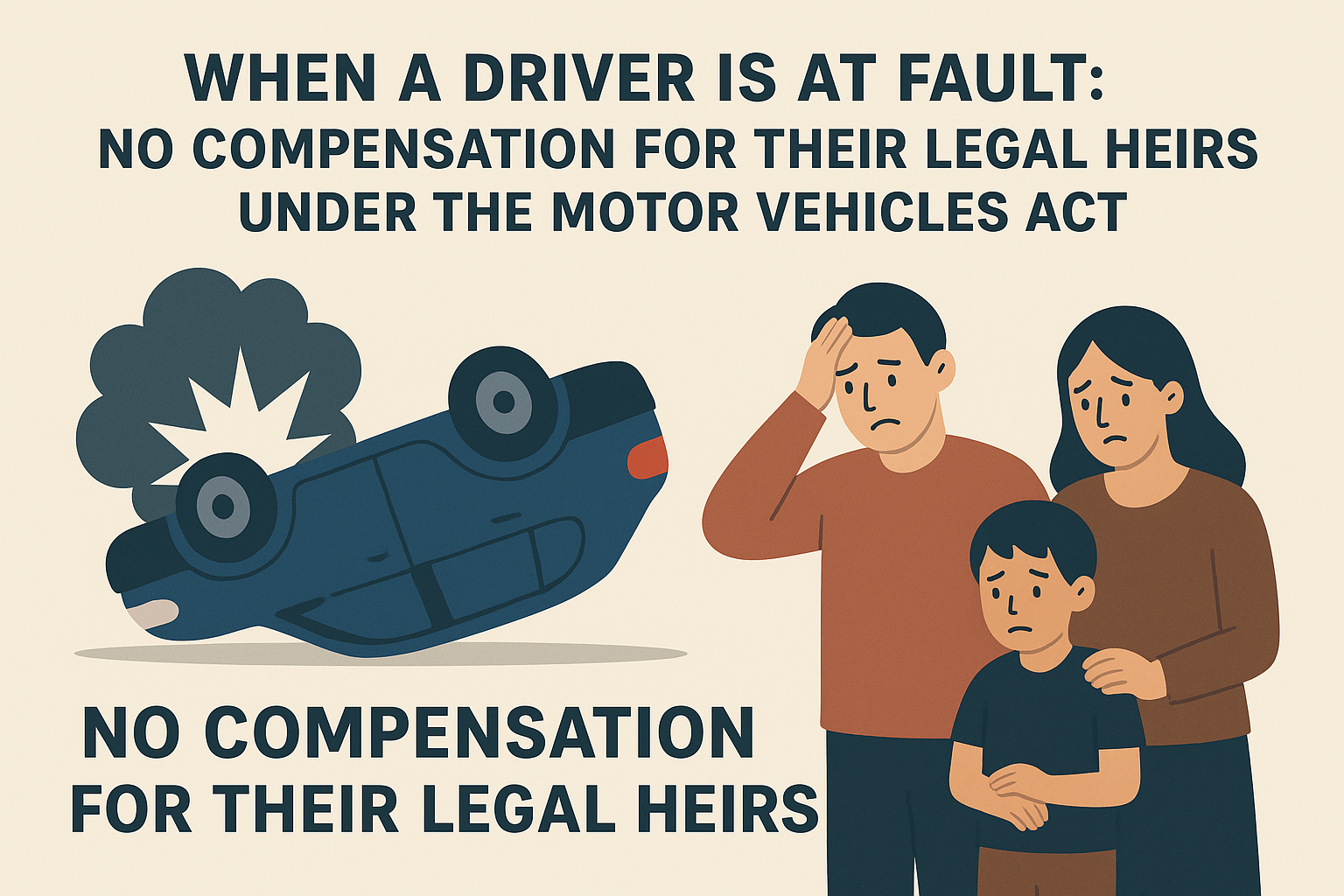View News
When-a-Driver-Is-at-Fault

When a Driver Is at Fault: No Compensation for Their Legal Heirs Under the Motor Vehicles Act
Introduction
In a significant judgment dated July 2, 2025, the Supreme Court reaffirmed that under Section 163A of the Motor Vehicles Act, 1988, the legal heirs of a driver who dies due to their own rash or negligent driving are not entitled to compensation. The Court reiterated that the no-fault compensation scheme does not extend to self-inflicted accidents, as a claimant cannot benefit from their own wrongful act.
The case arose from a June 18, 2014 accident where a Fiat Linea overturned, killing its driver. The driver’s wife, son, and parents sought ?80 lakh compensation under Section 163A, alleging a tyre burst caused the crash. However, the police chargesheet and eyewitness testimony established that the cause was reckless driving, not mechanical failure.
The Karnataka High Court and the Motor Accident Claims Tribunal (MACT) dismissed the claim, applying the self-tortfeasor principle—holding that a driver at fault in their own accident cannot be treated as a “third party” for the purposes of Section 163A.
The Legal Principle
-
Section 163A allows “no-fault” compensation to victims (or their legal heirs) of motor accidents causing death or permanent disablement, without the need to prove negligence of another party.
-
The Supreme Court clarified that this provision does not apply when the accident is self-caused due to the driver’s own negligence. In such cases, legal heirs are not third-party claimants and thus cannot seek compensation under this section.
Judicial Precedents Affirmed
The Court relied on settled jurisprudence, including:
-
Ningamma v. United India Insurance Co. Ltd. (2009) — Heirs of a borrower-driver are not “third parties” and cannot claim under Section 163A.
-
National Insurance Co. Ltd. v. Ashalata Bhowmik (2018) — Where a driver dies due to their own rash driving, heirs may claim only under personal accident (PA) cover, if available, and not under Section 166.
-
The Court also emphasised that Section 163A’s object is to protect innocent victims—not to enable a person (or their estate) to profit from their own wrongful conduct.
Key Implications
-
Clear Scope of Section 163A — Applicable only to independent third-party victims, not self-tortfeasors.
-
Insurance Position Strengthened — Insurers may lawfully deny such claims, aligning with contractual intent.
-
Uniformity in Law — Removes inconsistent interpretations among tribunals.
-
Promotes Road Safety — Disincentivises reckless driving by denying statutory benefits to heirs of negligent drivers.
Alternative Remedy: Personal Accident (PA) Cover
While Section 163A claims are barred in self-inflicted accidents, heirs may still receive compensation under a PA cover, if included in the policy. This is a contractual benefit, payable irrespective of fault, subject to the terms of the insurance policy.
Practical Guidance
-
For Claimants: Assess accident circumstances before filing Section 163A claims; explore PA cover benefits if applicable.
-
For Lawyers: Avoid pursuing untenable claims where the deceased was the negligent driver; rely on precedents like Ningamma (2009) and Ashalata Bhowmik (2018).
-
For Insurers: Apply this ruling to ensure claims settlement aligns with both statutory intent and policy terms.
Conclusion
The Supreme Court’s July 2025 decision underscores a long-standing legal position: Section 163A’s no-fault compensation is reserved for innocent third-party victims. When a driver’s own rash or negligent act causes their death, their legal heirs are not third-party claimants and cannot recover compensation under this provision. Instead, they may seek remedies only under applicable contractual covers like personal accident insurance.
By reaffirming the self-tortfeasor principle and drawing upon precedents such as Ningamma, Ashalata Bhowmik, Sangeetha, and Shivaji, the Court has clarified the contours of India’s motor vehicle compensation regime—ensuring it protects the truly innocent while discouraging negligent conduct.
"Unlock the Potential of Legal Expertise with LegalMantra.net - Your Trusted Legal Consultancy Partner”
Disclaimer: Every effort has been made to avoid errors or omissions in this material in spite of this, errors may creep in. Any mistake, error or discrepancy noted may be brought to our notice which shall be taken care of in the next edition In no event the author shall be liable for any direct indirect, special or incidental damage resulting from or arising out of or in connection with the use of this information Many sources have been considered including Newspapers, Journals, Bare Acts, Case Materials , Charted Secretary, Research Papers etc

